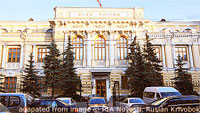Putin Said to Face Rift on Central Bank Role in Economy Plan

(Bloomberg – bloomberg.com – Evgenia Pismennaya & Olga Tanas – May 16, 2013) Russia’s government is split over empowering the central bank to support the economy as part of efforts to revive growth, leaving President Vladimir Putin to decide, according to an official familiar with the proposals.
While the government suggests lowering bank loan rates, slowing utility-price increases and compelling state companies to pay out a quarter of profit under international standards as dividends, its plan doesn’t resolve the questions over Bank Rossii’s responsibility for economic growth and how target levels for credit may be set, the official said, asking not to be identified as the recommendations aren’t public.
Putin, 60, who returned to the Kremlin for a third term a year ago, faces the weakest economic expansion since a 2009 contraction as demand wanes for the country’s commodity exports. Putin told Prime Minister Dmitry Medvedev’s government last month to settle their differences and submit a plan by May 15 on bolstering growth.
“The plan was sent to the Kremlin,” Putin’s spokesman Dmitry Peskov said yesterday. “No meetings are planned yet.”
The Economy Ministry has proposed making the central bank, which is shifting its policy regime to target inflation by 2015, responsible for economic growth together with the government. The ministry, led by Andrei Belousov, has also called for the regulator to publish benchmarks for banks’ lending rates. The measures are opposed by the Finance Ministry and central bank, the official said.
Blame Game
The debate reflects efforts to “shift responsibility from the government to the central bank,” said Vladimir Tikhomirov, chief economist at Otkritie Financial Corp. in Moscow.
Bank Rossii has limited scope to reignite growth using its interest-rate policy, with the economy remaining largely beholden to the government, according to Tikhomirov. A structural overhaul and a reduced state presence in the economy are needed to improve Russia’s outlook, he said today by phone.
Bank Rossii left the refinancing rate at 8.25 percent yesterday for an eighth month, brushing off government calls for lower borrowing costs to stimulate the economy and repeating an incremental cut to seldom used rates after inflation accelerated last month.
‘New Arguments’
“The Russian central bank has prioritized lowering inflation, while the government wants economic stimulus, and the Kremlin is finding new arguments to support its demands,” Julia Tsepliaeva, chief economist at BNP Paribas SA in Moscow, said in an e-mailed report. Putin is “very likely” to support amending the law governing Bank Rossii and making the regulator responsible for stimulating economic growth, she said.
High borrowing costs and tight budget policy are stifling economic activity, with a stronger ruble hurting the competitiveness of Russian exporters, Belousov said at a government meeting today. Global economic woes are eroding Russia’s overseas sales, with exports failing to grow in real terms for eight consecutive quarters, he said.
The economy has slowed for five straight quarters on an annual basis, bringing growth to 1.1 percent in the January-March period, according to Belousov.
The trend of slowing economic growth may be broken this quarter, with expansion set to exceed 3 percent in the second half, Belousov said.
Slowing Economy
Economic expansion decelerated to 2.1 percent in the fourth quarter from a year earlier. That prompted the Economy Ministry last month lowered its forecast for expansion this year to 2.4 percent, down from a projected 3.7 percent. The inflation rate rose to 7.2 percent in April from 7 percent increase in March, remaining more than one percentage point higher than the central bank’s target.
The ruble has lost about 4.2 percent against the dollar in the past three months, the fourth-worst performance among more than 20 emerging-market currencies tracked by Bloomberg. The ruble advanced 0.2 percent against the dollar to 31.3970 as of 1:55 p.m. in Moscow.
The 50-stock Micex (INDEXCF) Index stock index fell 0.6 percent to 1,384.07, its fifth day of declines. The benchmark gauge has dropped about 6 percent this year.
The revival plan, sent to Putin yesterday, includes a budget rule that caps federal spending based on long-term oil prices and forbids dipping into the country’s oil wealth funds to cover gaps, the person said.
25% Payout
The Finance Ministry won backing in the plan sent to Putin to make all state companies pay out a minimum 25 percent of profit under International Financial Reporting Standards, instead of Russian accounting rules, the person said. The ministry’s alternative call to increase dividend payouts to 35 percent was rejected, the person said. The Economy Ministry’s suggestion to cut the value-added tax and simultaneously reinstate a levy on sales was also set aside, the person said.
The federal budget will get 153 billion rubles ($4.9 billion) in extra income in 2013 if all state companies set their dividend payout at 25 percent, adding to this year’s planned budget intake from dividends of 172 billion, the Finance Ministry estimates.
“The plan is prepared,” Medvedev’s press secretary Natalya Timakova said yesterday by phone.
Article ©2013 BLOOMBERG L.P. ALL RIGHTS RESERVED. Article also appeared at http://www.bloomberg.com/news/2013-05-15/putin-said-left-facing-rift-on-stimulus-in-economy-revival-plan.html
